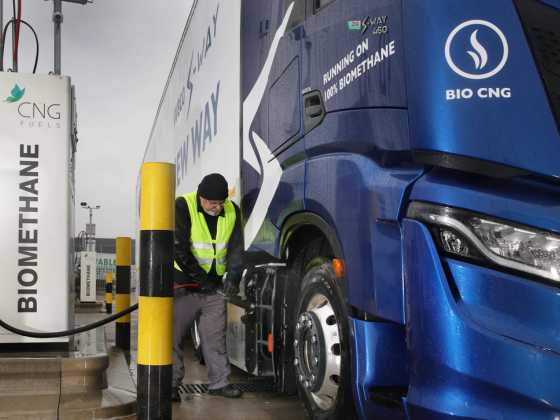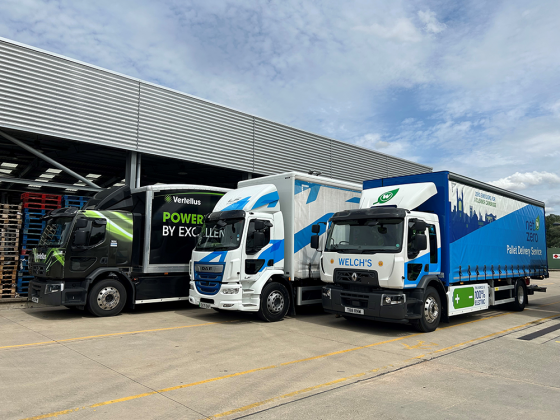Leasing panel discussion: the ban on new diesels

With the announcement that Britain is to ban pure diesel and petrol-powered cars and vans from 2040 in a bid to get people into zero or ultra-low emission alternatives, we ask our expert panel how this will affect fleets and how they should prepare
The UK government has said that it will end the sale of all new pure petrol and diesel cars and vans by 2040, as part of its plans to tackle illegal amounts of air pollution. This follows a similar announcement from the French government, who said they will outlaw purely diesel and petrol vehicles by the same date, as well as plans from Swedish manufacturer Volvo to make every new model fully or partially electric from 2019.
For our industry experts, this announcement was on the cards. David Cooper from Arnold Clark Vehicle Management points to the fact that the government had already committed to zero emission transport by 2050, and that this new ban of pure diesel and petrol-powered vehicles will “accelerate the timetable”.
Chris Salmon comments that the “future of diesel vehicles was already in question following recent and ongoing developments around vehicle emission testing and taxation”.
Rob Mills from Daimler Fleet Management believes that “a target date for new ICE sales to cease was always going to happen, especially with other countries having already announced their aspirational target dates”.
Meanwhile Matt Dale from ALD Automotive says that the new announcement “confirms that the switch to alternatively‑fuelled vehicles is not just a short term fad, but a long term change to the motor industry”.
What will happen to diesels?
So what immediate affect will the ban on ICE-powered vehicles have on diesel?
In July, registrations for new petrol and diesel cars declined by -3.0 per cent and -20.1 per cent respectively, according to Society of Motor Manufacturer and Trader (SMMT) figures.
The demand for alternatively‑fuelled vehicles meanwhile soared 64.9 per cent, taking a new record 5.5 per cent market share.
Rob Mills from Daimler Fleet Management believes that this trend will continue, but that manufacturers will still be investing in ways to make diesel technology cleaner. He says: “The manufacturers’ challenge and objective now is to restore trust in diesel and improve the NOx emission issue to demonstrate that diesel engines still provide the best opportunity to meet CO2 based environmental targets in the short to medium term.”
David Cooper from Arnold Clark Vehicle Management also sees the decline in diesel registrations as continuing, adding that there will be an inevitable effect on residual values for diesel-powered cars.
He adds: We expect sales of petrol cars to be much stronger. For vans, there will be very little change in the short-term.”
Chris Salmon from SG Fleet believes that diesel vehicles will not disappear overnight, and that they will remain a part of a fleet strategy for the foreseeable future.
Fleet concerns
This string of announcements regarding the end of pure-diesel and petrol‑fuelled vehicles signals a radical change in the transport industry, and many fleets may well be concerned about what this will mean for them.
Range anxiety of pure electric vehicles, charging infrastructure and cost are significant concerns for fleets considering alternative fuels, comments Matt Dale from ALD Automotive. Therefore, in order for fleets to plan confidently, Matt believes that the planning and development of alternative fuel vehicles (AFVs) is made public by the manufacturers and shared directly with fleet customers.
Matt says: “With greater knowledge, customers can then start to work with leasing partners to plan ahead with related products such as work and home based charge points. The leasing industry also needs to consider the future impact on residual values, and how vehicle life cycles could change.”
Chris Salmon from SG Fleet says: “Our clients want to understand the ramifications of any potential legislative change with regards their individual fleet requirements. It is up to us, as their strategic fleet partner, to be ahead of the curve wherever we can and look to provide potential alternatives should we believe they are more appropriate and result in efficiency or cost savings to our clients.”
Issues around the limited charging infrastructure and how taxation will be treated still need to be resolved, adds Chris, saying that until then, it really is “guess work.”
David Cooper from Arnold Clark Management believes that leasing clients will be concerned about costs and customer perception of moving away from diesel. He says: “With diesel residual values likely to fall, a company that buys its vehicles is likely to feel the pinch. Companies that lease vehicles will likely see a rise in rentals as leasing companies take account of pressure on diesel residuals. In the current climate, many companies are very concerned about their environmental credentials, and so it’s likely that company car policies will be reviewed in light of ongoing health concerns about diesel.”
Rob Mills from Daimler Fleet Management cites “uncertainty” as one of the main factors that keeps business leaders awake at night. He says: “Until fairly recently, planned legislation has been communicated in good time to enable businesses including vehicle manufacturers to plan accordingly. Whilst 2040 still feels a long way off, the reality is that further changes in the interim will still need to be made in order to achieve the environmental targets.”
Amid the hype around diesels, David Cooper from Arnold Clark Vehicle Management advises against the industry taking a “knee‑jerk” reaction. He says: “There are concerns with diesel, but the fact remains that converting a diesel fleet to petrol will be more expensive. For drivers travelling larger distances, diesel is still the preferred option. It’s important to bear in mind that there’s really no alternative for HGVs.”
Incentives & policies
With the government planning to ban the sale of new diesel and petrol vehicles by 2040, what further policies should be put in place to support those buying alternative fuel vehicles?
Matt Dale from ALD Automotive says that policy change could assist in various different areas. He says: “The BIK for a vehicle with emissions sub 50g/km is great, but it doesn’t necessarily promote the right user behaviours, and the VED changes can have a negative impact on buying and running a new plug-in hybrid electric vehicle. The government needs to apply common sense to any future changes and find a balance in both the retail and fleet markets.”
“Public charging is a key area to look at, especially the accessibility of charging, having to rely on different apps and charge cards is far from ideal,” Matt adds.
Commenting further on the issue of the EV charging infrastructure, Rob Mills from Daimler Fleet Management says: “The charging infrastructure issue remains a confusing arena with various claims that the national grid will not be able to cope without further investment and debates on who will pay for the charging network. So clear plans need to be instigated to address these concerns to give companies.”
David Cooper from Arnold Clark Vehicle Management picks up on this point about the impact EVs will have on the grid if there is a rapid rise in EVs. He says: “We will have to address the fact that power stations will need to produce more electricity. How is that electricity going to be generated? And how is the electricity going to be stored? In general terms, cars are used during the day and parked overnight. That means that we’ll need power to charge these vehicles at certain times of the day.”
Chris Salmon from SG Fleet also believes the infrastructure needs to be considered, as well as and taxation. What’s more, he urges fleets to consider that “age old question” of whether the vehicle is fit for purpose. He says: “We work with our clients to understand their current fleet policy and the reasons behind that, before considering recommending a solution that may work on paper but in reality would be counter productive.”
Clean Air Zones
The UK has struggled to keep within EU limits on air pollution and has been required to draft air quality plans to address the issue. Whilst the strategy is still in proposal phase, it includes the requirement for the worst offending cities to introduce Clean Air Zones in polluting areas. Cities confirmed so far are Birmingham, Leeds, Nottingham, Derby, Southampton. Manchester is planning a voluntary one, and London has a Ultra Low Emission Zone confirmed for 2019.
With these changes happening, how can the leasing industry support businesses that will operate within Clean Air Zones (CAZ)?
“The introduction of the Clean Air Zones will accelerate the adoption of AFVs in these areas, so the leasing industry needs to help fleet customers understand the implications for their staff and businesses,” says Matt Dale from ALD Automotive. “This will impact both major corporates and SMEs in the same way, and they all need to understand that this is happening quickly. Some business may want to change their vehicles early to avoid possible congestion charges and create green travel plans for staff to get to work, or implement new schemes to help employees obtain cleaner vehicles.”
David Cooper from Arnold Clark Vehicle Management highlights the fact that the proposed CAZ legislation suggests that local authorities will have the power to offer exemptions for local residents, but questions whether the same will be offered
to businesses. “In either event,” David says, “we would encourage affected clients to choose ultra low emission vehicles where possible.”
Rob Mills from Daimler Fleet Management says that lease companies will have to become fully conversant both with the general CAZ regulations and those adopted by each participating city, as some may choose to adopt higher standards and/or implement a different classification that may or may not include cars and vans. He explains: “A City adopting a Class A scheme for instance will only impact buses, coaches, taxis & private hire vehicles whilst a Class D scheme will also cover cars that are not Euro 6.”
“With this understanding,” Rob continues, “the lease company can provide guidance and look to help shape a fleet policy that meets the criteria of the cities the business will operate in. Most lease companies will look at providing favourable early return charges in return for repeat business which will assist businesses in switching to Euro 6 vehicles if they have older vehicles on long term leases that are no longer viable due to CAZ regulations.”
Chris Salmon from SG Fleet says: “With regards the clean air zones, we can support our clients by ensuring they are making informed choices around vehicles that may need to be utilised within these areas and what impact that may have.”
Expert Final Thoughts
Matt Dale
The planning and development of alternative fuel vehicles over the coming years needs to be made public by the manufacturers, and shared directly with fleet customers to give them confidence when investing in this evolution.
With greater knowledge, customers can then start to work with leasing partners to plan ahead with related products such as work and home‑based charge points. The leasing industry also needs to consider the future impact on residual values, and how vehicle life cycles could change.
David Cooper
The next generation of electric vehicles is only a couple of years away. When these cars arrive, and we can travel up to 300 miles between charges, the popularity of electric vehicles is likely to increase exponentially. Range anxiety will no longer be a problem, which will encourage more businesses and drivers to look at electric vehicles
Rob Mills
Uncertainty is probably one of the main factors that keeps business leaders awake at night whether it’s the impact of Brexit or legislative changes that impact how they run their businesses. Until fairly recently, planned legislation has been communicated in good time to enable businesses including vehicle manufacturers to plan accordingly. Whilst 2040 still feels a long way off, the reality is that further changes in the interim will still need to be made in order to achieve the environmental targets.
Chris Salmon
Our clients want to understand the ramifications of any potential legislative change with regards their individual fleet requirements – it is up to us, as their strategic fleet partner, to be ahead of the curve wherever we can and look to provide potential alternatives should we believe they are more appropriate and result in efficiency or cost savings to our clients. There are a number of key questions still unanswered in this area; issues around the limited charging infrastructure and how taxation of electric vehicles will be treated still need to be resolved.






